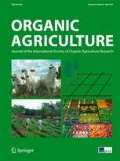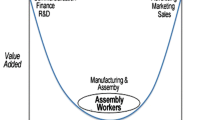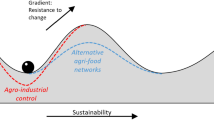Abstract
This study presents two hypothetical challenges: (1) the actors in the Finnish food chain do not have a common community that would cover the entire food chain from primary producers to the consumers of organic food and that would, by communal effort, enhance the development of the organic food chain, and (2) a fairer share of power among the food chain actors would enable the development of the organic food chain. The literature supports these arguments; the collaboration occurs mainly on a horizontal level and leaves actual consumers outside the direct collaboration. The division of power, according to the results of other studies, is uneven, biased, and twisted among the food chain actors. In this study, the two arguments were presented to two focus groups: one in the local food chain and other at national food chain level. The focus group discussions confirm the arguments that the activity of the food chain happens mainly on a horizontal level, and that the power is unevenly distributed among the food chain actors. The understanding of the influences of the lack of a common food chain-based community on the development of the organic food chain, and the proposed means for tackling the challenges, were heterogeneous. The understanding of the profitability and potential of such a food chain-based community was to a large extent missing in the agricultural and industrial part of the food chain, especially. The oversized strength of retail companies, the underdeveloped capability of other food chain stakeholders to take control of food marketing and the oversized bureaucracy were seen as the main reasons for the unfair share of power, which situation was even partially accepted. According to the vision of the focus group members, the Finnish organic food chain will be a multifaceted combination of small- and medium-sized local enterprises and large national level enterprises acting at the food chain level, but also accepting alternative marketing channels such as food processing and sales at a farm level. The food chain is dynamic and diverse. The enterprises are in a process of constant development as regards the volume and level of their activity. This development trend and the challenges discussed are typical in many western countries, and therefore, this article with its results provides a useful opening for food chain level discussions in many other countries.


Similar content being viewed by others
References
Aschemann J, Hamm U, Naspetti S, Zanoli R (2007) The organic market. In: Lockeretz W (ed) Organic farming: an international history. CAB International, Massachusetts, pp 123–151
Barrios EX, Bayarri S, Carbonell I et al (2008) Consumer attitudes and opinions toward functional foods: a focus group study. J Sens Stud 23:514–525. doi:10.1111/j.1745-459X.2008.00169.x
Clonan A, Holdsworth M, Swift J et al. (2009) Awareness and attitudes of consumers to sustainable food. In Ethical Futures: Bioscience and Food Horizons. Wageningen University, Wageningen, pp 205–210
Digal LN (2011) Market power in the Philippine retail and processed food industry. J Int Food Agribusiness Market 23:289–297. doi:10.1080/08974438.2015.1006716
Domina D A,Taylor C R (2010) The debilitating effects of concentration markets affecting agriculture. Drake Journal of Agricultural Law 15:61–108. doi: org/10.1080/14735903.2013.806408
ECG (2014) Economy for the common good—An economic model for the future. https://www.ecogood.org/en. Accessed 26 October 2014
Ellen MacArthur Foundation (2013) Towards the circular economy—opportunities for the consumers goods sector, Ellen MacArthur Foundation. http://www.ellenmacarthurfoundation.org/circular-economy. Accessed 28 December 2014
Engeström Y (1987) Learning by expanding. Orienta-Konsultit Oy, Helsinki
ETL (2012) Elintarviketeollisuus lyhyesti, Food industry shortly. http://www.etl.fi/www/fi/elintarviketeollisuus/index.php. Accessed 8 August 2012
European Commission (2010) Commission regulation (EC) No 889/2008 of 5 September 2008, Laying down detailed rules for implementation of Council Regulation (EC) No 834/2007 on organic production and labelling of organic products with regard to organic production, labelling and control. http://eur-lex.europa.eu/legal-content/EN/ALL/?uri=CELEX%3A32008R0889. Accessed 15 October 2011
European Commission (2015a) Definition for organic farming. http://ec.europa.eu/agriculture/organic/organic-farming/what-is-organic-farming/index_en.htm. Accessed 2 October 2015
European Commission (2015b) The DOOR - database of origin and registration http://ec.europa.eu/agriculture/quality/door/list.html;jsessionid=pL0hLqqLXhNmFQyFl1b24m?locale=en. Accessed 30 December 2015
European Parliament (2002) Regulation (EC) No 178/2002 of the European Parliament and of the council of 28 January2002 laying down the general principles and requirements of food law, establishing the European Food Safety Authority and laying down procedures in matters of food safety, Brussels. http://www.eur-lex.europa.eu/LexUriServ/LexUriServ.do?uri=OJ:L:2002:031:0001:0024:en:PDF. Accessed 17 June 2015
European Union (2012) Regulation (EU) No 1151/2012 of The European Parliament and of The Council of 21 November 2012 on quality schemes for agricultural products and foodstuffs, Brussels. http://www.eur-lex.europa.eu/legal-content/en/TXT/?uri=CELEX%3A32012R1151. Accessed 17 June 2015
Evira (2014) Luomutilat (kpl) ja luomutuotantoala (ha) 2014. Organic farms and farmland 2014. http://www.evira.fi/files/attachments/fi/evira/asiakokonaisuudet/luomu/tilastot/luomu_2014ep.pdf. Accessed 8 May 2015
Evira (2015a) Luomun valvontaraportti 2014. Report of organic control in 2014, Evira, Helsinki. https://www.evira.fi/files/attachments/fi/evira/asiakokonaisuudet/luomu/ajankohtaista/viljelijakirje_1-2014.pdf. Accessed 17 October 2015
Evira (2015b) Luomutilat ja luomutuotantoala 2015. Organic farms and farmland in 2015 http://www.evira.fi/portal/fi/tietoa+evirasta/asiakokonaisuudet/luomu/tilastot+ja+tietohaut/. Accessed 10 February 2015
FAO (2014) Building a common vision for sustainable food and agriculture. FAO, Rome, http://www.fao.org/3/919235b7-4553-4a4a-bf38-a76797dc5b23/i3940e.pdf. Accessed 19 September 2015
Felber C (2015) Change everything—creating an economy for the economy of common good. Zed books, London
Frank RH (2012) The Darwin economy: liberty, competition, and the common good. Princeton, New York
Freeman T (2006) Best practice in focus group research: making sense of different views. J Adv Nurs 56:491–497. doi:10.1111/j.1365-2648.2006.04043.x
Greenbaum TL (1998) The handbook for focus group research, 2nd edn. Sage Publications, Thousand Oaks
Grönroos C (2011) Value co-creation in service logic: a critical analysis. Mark Theory 11:279–301. doi:10.1177/1470593111408177
Grönroos C, Voima P (2013) Critical service logic: making sense of value creation and co-creation. J Acad Mark Sci 41:133–150. doi:10.1007/s11747-012-0308-3
Holling CS (2001) Understanding the complexity of economic, ecological, and social systems. Ecosystems 4:390–405. doi:10.1007/s10021-001-0101-5
Hyvylä L (2014) Toimialaraportti-Lihateollisuus. Annual report of the meat industry. Ministry of Employment and the Economy, Helsinki
Irz X, Niemi J, Xing L (2011) Determinants of food price inflation in Finland. Energy Policy 63:656–663. doi:10.1016/j.enpol.2013.09.023
Jarratt D, Stiles D (2010) How are methodologies and tools framing managers’ strategizing practice in competitive strategy development? Br J Manag 81:28–43. doi:10.1111/j.1467-8551.2009.00665.x
Kottila M R (2010) Understanding the organic chain—the framework of the interaction between actors in organic chains in relation to the ecological modernisation of food production. Dissertation, Helsinki University
Kottila M R (2011) Luomualan kasvu- ja kehitysohjelma 2011–2015. The development program for organic growth and development 2011–2015. http://www.luomu.fi/wp-content/uploads/2011/08/Luomualan-kasvu-ja-kehitysohjelma.pdf. Accessed 13 January 2012
Kottila M R, Maijala A, Rönni P( 2005) The organic food supply chain in relation to information management and the interaction between actors. 1st ISOFAR International Conference on Organic Agriculture, Adelaide 21 21–23.9.2005. http://orgprints.org/4402/4/4402-Kottila_etal_4p_revised-ed.pdf. Accessed 12 June 2011
Kottila MR, Rönni P (2008) Collaboration and trust in two organic food chains. Br Food J 110:376–394. doi:10.1080/10454446.2011.548733
Kottila M R, Rönni P (2006) Consumption of organic products: challenge for performance of supply chain. Joint Organic Congress, Odense 30–31.5.2006. http://orgprints.org/7244/. Accessed 25 September 2012
Kuluttajaliitto (2015) The Consumers’ Union of Finland. http://www.kuluttajaliitto.fi/briefly_in_english. Accessed 9 October 2015
Kuosmanen T, Niemi J (2009) What explains the widening gap between the retail and producer prices of food? Agric food sci 18:317–331, doi: URN:NBN:fi-fe2015090311176
Magnusson MK, Arvola A, Koivisto-Hursti UK (2001) Attitudes towards organic foods among Swedish consumers. Br Food J 10:209–227. doi:10.1108/00070700110386755
MaRa (2015) The Finnish Hospitality Association. http://www.mara.fi/en/mara-2. Accessed 8 October 2015
MMM (2001) Ehdotus luonnonmukaisen elintarviketuotannon kehittämisestä. Suggestion for the development of organic food production. http://wwwb.mmm.fi/julkaisut/tyoryhmamuistiot/2001/TR2001_10.PDF;. Accessed 9 September 2011
MMM (2010a) Huomisen Ruoka - kansallinen ruokastrategia, versio 16, esitys Suomen hallitukselle ja eduskunnalle. Tomorrow’s Food - a national food strategy, version 16, presentation to the Finnish government and parliament. http://mmm.fi/documents/1410837/1801180/Huomisen+ruoka+%E2%80%93+Esitys+kansalliseksi+ruokastrategiaksi/db6d286f-8e9c-4521-85b5-5b17cfe0cc25. Accessed 16 April 2013
MMM (2010b) Valtioneuvoston selonteko ruokapolitiikasta., Government’s report on food politics, http://www.mmm.fi/attachments/maatalous/maatalouspolitiikka/newfolder_14/5tTDQgjLk/selontekosuomi.pdf; Accessed 6 July 2012
MMM (2014) More organic! Government development program for the organic product sector and objectives to 2020. Helsinki, Ministry of Agriculture and Forestry
MMM (2015) Aitojamakuja.fi. Authentic tastes. Ministry of Agriculture and Forest http://www.aitojamakuja.fi/index_eng.php?lang=eng. Accessed 30 December 2015
Morgan DL (1996) Focus groups. Annu Rev Sociol 22:129–152. doi:10.1146/annurev.soc.22.1.129
MTK ry (2012) Presentation. http://www.mtk.fi/mtk/fi_FI/mtk/. Accessed 13 August 2012
Mäntyranta T, Kaila M (2008) Fokusryhmähaastattelu laadullisen tutkimuksen menetelmänä lääketieteessä. Focus group interview as a qualitative research method in medical sciences. Duodecim 124:1507–1513, http://www.ebm-guidelines.com/xmedia/duo/duo97349.pdf. Accessed 12 December 2014
Niemi J, Jansik C, Huan-Niemi E (2011) Price formation and margin behaviour in the Finnish food markets. In 21th IFAMA World Symposium, Frankfurt, 20-21 June 2011
Nuutila J (2015) Acceptance of the most common quality attributes of organic food in the Finnish food chain. In: Zeverte-Rivza S (ed) Proceedings of the 25th NJF Congress Riga, Latvia, 16th-18th of June 2015. NJF, Riga, pp 318–323
Nuutila J, Kurppa S (2016) The Finnish organic food chain—an activity theory approach. Org Agric 6:49–56. doi:10.1007/s13165-015-0114-6
OKM, TEM (2012) Growth through expertise—action plan for research and innovation policy, Ministry of Education and Culture. Helsinki, Ministry of Employment and Economy
Ordanini A, Pasini P (2008) Service co-production and value co-creation: the case for a service-oriented architecture (SOA). Eur Manag J 26:289–297. doi:10.1016/j.emj.2008.04.005
Parker A, Tritter J (2006) Focus group method and methodology: current practice and recent debate. Int J Res Method Educ 29:23–37, doi: 10.12691/ajap-1-2-2
Payne A, Storbacka K, Frow P (2008) Managing the co-creation of value. J Acad Market Sci 36:83–96. doi:10.1007/s11747-007-0070-0
Pro Luomu Ry (2014) Organics in Finland 2014. Association, Finnish Organic Food, http://www.proluomu.fi/english/. Accessed 12 March 2015
Pro Luomu ry (2012) More Organic Program – Luomua lisää - Luomualan kehittämissuunnitelman toimeenpanosuunnitelma. http://www.proluomu.fi/wp-content/uploads/2012/09/Toimeenpanosuunnitelma-lopullinen-26062012.pdf. Accessed 20 June 2013
ProAgria (2015) The Best of Province. http://www.maakuntienparhaat.fi/en/foodstuff/. Accessed 30 December 2015
PTY (2014) Päivittäistavarakaupan tilastot - markkinaosuudet 2013. Statistics of retail sales and market shares in 2013. Finnish Grocery Trade Association. http://www.pty.fi/julkaisut/tilastot/. Accessed 2 January 2015
PTY (2012) The Finnish Grocery Trade Association. http://www.pty.fi/front-page/front-page/. Accessed 8 October 2015
Richards TJ, Pofahl G (2010) Pricing power by supermarket retailers: a ghost in the machine? Choices: The Magazine of Food, Farm & Resource Issues 25:1–12, http://ageconsearch.umn.edu/bitstream/94764/2/25-2%20Pricing%20Power.pdf. Accessed 12 September 2015
Ruokastrategiaryhmä (2010) Huomisen ruoka - Kansallisen ruokastrategian taustaraportti. Tomorrows food - the back ground report of the food strategy board. http://www.mmm.fi/attachments/mmm/tiedotteet/5qZTFTgQg/Huomisen_ruoka_-_kansallisen_ruokastrategian_taustaraportti.pdf. Accessed 1 October 2010
Ruokatieto (2014) Forkful of facts 2014. http://www.ruokatieto.fi/sites/default/files/Liitetiedostot/tietohaarukka2014_englanti.pdf. Accessed 15 October 2014
Schienstock G, Hämäläinen T (2001) Transformation of the Finnish innovation system: a network approach. SITRA, Helsinki, http://www.sitra.fi/julkaisut/raportti7.pdf. Accessed 12 October 2014
Schmid O, Kilchsperger R, Bondini A (2007) Organic farming values in Switzerland–results of a focus group study, Zwischen Tradition und Globalisierung–9. Wissenschaftstagung Ökologischer Landbau 20–23.3.2007. Universität Hohenheim, Stuttgart
Seppänen L, Toiviainen H (2015) Relational agency in the development of tools of service networks. In: Edwards A (ed) Collaborating on complex problems: cultural historical accounts of relational work. Oxford University Press, Oxford
Seppänen L, Heikkilä H, Kira M et al (2014) Palveluverkostojen muuttuvat toimintakonseptit - Asiakasymmärrys, välineet ja työhyvinvointi verkostoyhteistyössä. The changing activity concepts of the service networks - Customer understanding, tools and work wellbeing in network collaboration. Työterveyslaitos, Tampere
Silverman D (2000) Doing qualitative research, a practical handbook. SAGE Publications Ltd, London
Stolz H, Jahri I, Baumgart L et al. (2010) Sensory Experiences and Expectations of Organic Food: Results of Focus Group Discussions, Research Institute of Organic Agriculture. http://orgprints.org/20233/1/deliverable_4_2_consumer_research.pdf. Accessed 20 May 2013
Van Loo EJ, Diem MNH, Pieniak Z et al (2013) Consumer attitudes, knowledge, and consumption of organic yogurt. J Dairy Sci 96:2118–2129. doi:10.3168/jds.2012-6262
Vargo SL, Maglio PP, Akaka MA (2008) On value and value co-creation: a service systems and service logic perspective. Eur Manag J 26:145–152. doi:10.1016/j.emj.2008.04.003
VN (2007) Prime Minister Vanhanen’s II Government Program - Pääministeri Matti Vanhasen II hallitusohjelma19.4.2007 – 22.6.2010. http://www.valtioneuvosto.fi/documents/10184/368562/hallitusohjelma-vanhanen-II/2a27514c-b939-4bb6-9167-ce886c358dff. Accessed 22 June 2012
VN (2011) Prime Minister Katainen’s Government Program-Pääministeri Jyrki Kataisen hallitusohjelma 22.6.2011. http://www.vnk.fi/documents/10616/622966/H0111_P%C3%A4%C3%A4ministeri+Jyrki+Kataisen+hallituksen+ohjelma.pdf/a49b3eb5-9e98-44c6-bd92-b054bea36f61?version=1.0. Accessed 22 June 2012
VN (2013) Government decision-in-principle on the promotion of sustainable environmental and energy solutions (cleantech solutions) in public procurement. Finnish government, Helsinki, https://www.tem.fi/files/37754/GOVERNMENT_DECISION-IN-PRINCIPLE_ON_THE_PROMOTION_OF_SUSTAINABLE_ENVIRONMENTAL_AND_ENERGY_SOLUTIONS_(CLEANTECH_SOLUTIONS)_IN_PUBLIC_PROCUREMENT.pdf. Accessed 12 October 2015
VN 948/2011 (2011) Kilpailulaki (Legislation for competition), Helsinki. http://www.finlex.fi/fi/laki/ajantasa/2011/20110948. Accessed 10 October 2015
Wier M, Millock K, Rosenkvist L (2005) New tendencies in the organic food market. In: International Conference on Organic Agriculture, Adelaide, 9.2005. http://orgprints.org/4753. Accessed 16 July 2012
Xavier I, Niemi J, Xing L (2011) Determinants of Food Price Inflation in Finland. EAAE 2011 Congress Change and Uncertainty, Challenges for Agriculture, Food and Natural Resources 30.8-2.9.2011, Zurich. http://www.mtt.fi/wwwdoc/ruuanhinta101111/Determinants_of_Finnish_food_price_inflation.pdf. Accessed 1 June 2015
YM (2005) Vähemmästä enemmän ja paremmin - kestävän kulutuksen ja tuotannon toimikunnan (KULTU) ehdotus kansalliseksi ohjelmaksi. Less is more and better - the suggestion of the sustainable consumption and production board to a national program. http://www.ym.fi/fi-FI/Ajankohtaista/Julkaisut/Erillisjulkaisut/Vahemmasta_enemman_ja_paremmin_Kestavan_(4706). Accessed 10 June 2012
Zagata L (2014) Towards conscientious food consumption: exploring the values of Czech organic food consumers. Int J Consum Stud 38:243–250. doi:10.1111/ijcs.12098
Zander K, Hamm U (2010) Consumer preferences for additional ethical attributes of organic food. Food Qual Prefer 21:495–503. doi:10.1016/j.foodqual.2010.01.006
Zwick D, Bonsu SK, Darmody A (2008) Putting consumers to Work: “Co-creation” and new marketing govern-mentality. J Consum Cult 8:163–196. doi:10.1177/1469540508090089
Acknowledgments
We thank our employers, the Natural Resources Institute Finland, and the Finnish Organic Research Institute and the Ministry of Agriculture and Forests in Finland for financing this research.
Author information
Authors and Affiliations
Corresponding author
Rights and permissions
About this article
Cite this article
Nuutila, J., Kurppa, S. Two main challenges that prevent the development of an organic food chain at local and national level—an exploratory study in Finland. Org. Agr. 7, 379–394 (2017). https://doi.org/10.1007/s13165-016-0163-5
Received:
Accepted:
Published:
Issue Date:
DOI: https://doi.org/10.1007/s13165-016-0163-5




